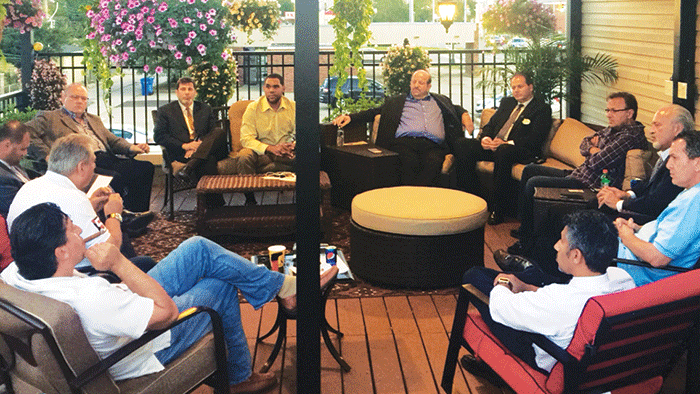
|
| Arab and Chaldean leaders meet at The Arab American News office. |
DEARBORN — Local leaders and activists are forming a new coalition aimed at building bridges and promoting understanding between the Arab American and Chaldean American communities, following escalating tensions last month involving a proposed and rejected Sterling Heights mosque.
The Arab Chaldean Friendship Forum (ACF) will consist of both Arab American and Chaldean American leaders, who will meet routinely to aim to find strategies to build harmony between the communities of the Muslims and Christians in metro Detroit and abroad.
The proposed construction of a mosque at 15 Mile and Ryan Road had led to heavy opposition from residents in Sterling Heights, including some members of the Chaldean community. The mosque controversy later spilled over into the Arab American and Chaldean American communities, enticing friction and scrutiny among both groups.
Following the rejection of the mosque by the City Planning Commission, local Arab and Chaldean leaders met during three separate meetings in September to discuss how they could combat the issues between the communities.
The first meeting took place at The Arab American News office in Dearborn. During the meeting, leaders recognized that tensions were alarmingly on the rise between both communities and that a long-term project would need to be formed to reverse it.
A second meeting with the same leaders took place in West Bloomfield, where it was decided that a committee would be formed to tackle the issues prevailing among both communities.
This week, a third meeting was held at the LaPita restaurant in Dearborn, where details and dates for the committee were finalized.
John Oram, a local Chaldean leader, said the communities should not allow a skewed viewpoint of recent immigrants to impact the partnerships formed by Muslims and Christians.
“The committee was formed because of a legal issue that turned into an issue of hatred involving the Middle East,” Oram said. “We have to keep the relationship we have formed with the Christian and Muslim communities over the last 40 years. I was struck over the reaction of the new people who arrived here from Iraq and Syria. They had every right to feel that way, but they are barking up the wrong tree.”
Oram acknowledged that both sides have resorted to insults and back and forth bantering that needs to be addressed and resolved. He said local leaders refuse to let the negativity impact the relationships between both communities in metro Detroit.
“We have over 500 Muslim and Christian partners in the medical field,” Oram said. “I think if we don’t put the lid on it now, it will get ugly and that’s not right. I’m a proud Chaldean and I think it’s a two-way street. Both sides made comments and we are going to have to work it out. There is no other choice.”
Ali Jawad, a local Arab American leader, echoed Oram’s statements. Jawad said the majority of Arab American and Chaldean Americans have formed a close relationship over a span of decades that should stay on the same course.
“We are brothers, we’ve had a lot of history together,” Jawad said. “We don’t want these few bad apples in both communities to ruin this. The two communities have always been together. We’ve gotten a lot of refugees who are focused on the troubles that happened in the Middle East. We can’t let them hijack our voices. We are a voice of reason and leadership.”
According to leaders involved in the ACF, including The Arab American News Publisher Osama Siblani, an announcement will be coming within the next week that will lay out the details of the committee.






Leave a Reply